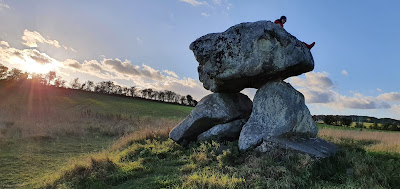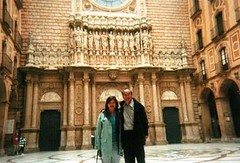 |
| Fyfield Down Neolithic Stones |
'Two are better than one because they have a good return for their labour: If either of them falls down one can help the other up. But pity anyone who falls and has no one to help them up.' Ecclesiastes 4:9-10
A sad commentary of our individual-centric modern living reality is found in the words of Simon and Garfunkel ‘I am a rock. I am a Island’ This song drums in all the loneliness of life without companionship or friendship. The second verse reads,
“I've built up walls, a fortress deep and mighty,
that nothing penetrates.
I have no need of friendship; friendship causes pain.
It's laughter and it's loving I disdain.
I am a rock, I am an island.”
During the lockdown caused by Covid-19, our church decided to house homeless people. We discovered to our dismal surprise that there are many homeless men and women in Singapore!
They preferred to be left alone; pitiful sights of old men and women left to wander alone in crowded cities. In 1969, Ralph McTell wrote the song, "The Streets of London." It was inspired as Mc Tell was basking at the Surrey Street market in Croydon. The song laments the plight of the homeless, lonely and elderly who are largely ignored by society.
We ask, why this sad state of affairs? The likely answer is that in a modern city, Singapore included, everyone is busy. We are too busy with climbing up the corporate ladder, too busy for anyone. Along with this busyness is a healthy dose of selfishness; too much of worrying of one's self to be concerned with others.
In the many places that Pat and I have visited around the world, we view with much pity the lonely lives of old men and women. This is a sad reflection of modern societies that revere individualism and independence and do not value friendships, dependencies and community.
They preferred to be left alone; pitiful sights of old men and women left to wander alone in crowded cities. In 1969, Ralph McTell wrote the song, "The Streets of London." It was inspired as Mc Tell was basking at the Surrey Street market in Croydon. The song laments the plight of the homeless, lonely and elderly who are largely ignored by society.
"Have you seen the old man in the closed-down market
Picking up the paper, with his worn out shoes?
In his eyes you see no pride and hands held loosely by his side
Yesterday's paper telling yesterday's news.
So how can you tell me you're lonely, And say for you that the sun don't shine?
Let me take you by the hand and lead you through the streets of London
I'll show you something to make you change your mind."
Remember the song, “The Cat’s in the Cradle?” The son is always asking his dad when is he coming home. The father replies that he will be home soon enough but he does not know when. But when the dad comes home they are going to have a good time together. Unfortunately, this never happens. So tragically when the father finally had the time, the kid had grown up and this time the kid has no time for this dad.
The last verse of the song recorded that the father retired and now has time for his son but the son is too busy.
I used to think that I would work till I die but when I turned 68, I decided that I will retire. I realised that the desire to keep on working was an ego trip designed to satisfy the feeling of being wanted or important at work. I changed my mind because by that time we had an empty nest at home for several years. I felt that the two of us, Pat and I should be able to spend our remaining years with each other and with people who are dear to us.
So now we decided to holiday more and visit with our two daughters and their families in Newcastle, Australia and Marlborough, UK. We enjoy the privilege of scenic views, different cultures, different cuisines and understanding different histories. We realised that the world has diminished in size; people and places are not that far away after all. It is good to be able to view life and world together.
We were ever so busy, growing our marriage, my career and our two daughters. Watching our children through their childhood and formative years was a delight. Before we know it we have been married 45 years now. The time to build a career and raising a family has taken all our attention. Before we grow too old, we should appreciate what we have the love, the companionship and the time for each other.
This was also the insight for King Solomon in Ecclesiastes 4:8-12. Solomon concluded that life on earth was futile. The sad commentary Solomon made was about a rich man who was all alone. No one, no family, no relatives, no friends,
'There was a man all alone; he had either son nor brother. There was no end to his toil, yet his eyes were not content with his wealth. "For whom am I toiling," he asked, "and why am I depriving myself of enjoyment?" This too is meaningless- a miserable business!' Ecclesiastes 4:8
Solomon came to the conclusion,
'Two are better than one, because they have a good return for their labour: If either of them falls down, one can help the other up. Also if two lie down together, they will keep warm. But how can one keep warm alone? Though one may be overpowered, two can defend themselves, A cord of three strands is not quickly broken.' Ecclesiastes 4:9-12
In the many places that Pat and I have visited around the world, we view with much pity the lonely lives of old men and women. This is a sad reflection of modern societies that revere individualism and independence and do not value friendships, dependencies and community.
John Donne, who was left alone and expected to die of bubonic plague wrote in 1623. "No man is an island, entire of itself; Every man is a piece of a continent, a part of the main..."
Loneliness should not happen in Christian communities. An understanding of the fellowship and interdependencies between men and women was evident in the early church among apostles and believers,
'They devoted themselves to the apostles' teaching and to the fellowship, to the breaking of bread and to prayer.' Acts 2:42.
Appreciating neighbourliness and friendships is a counterpoise to the proud and boastful, "I am a rock, I am an island." Better the old Swedish saying, 'Shared joy is double joy, shared sorrow is half a sorrow.'
· Lionel
Updated 1st published 12 Jul 2008

